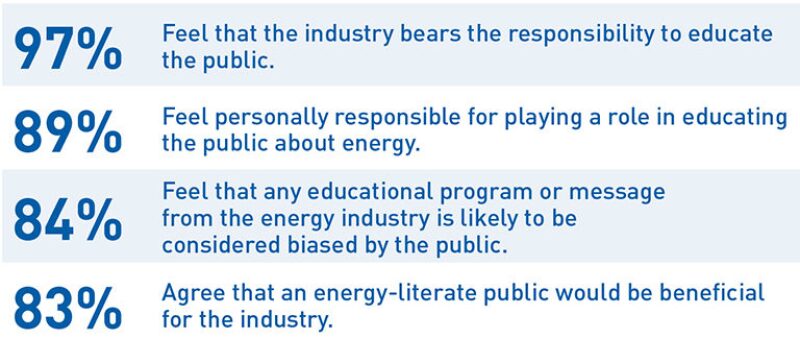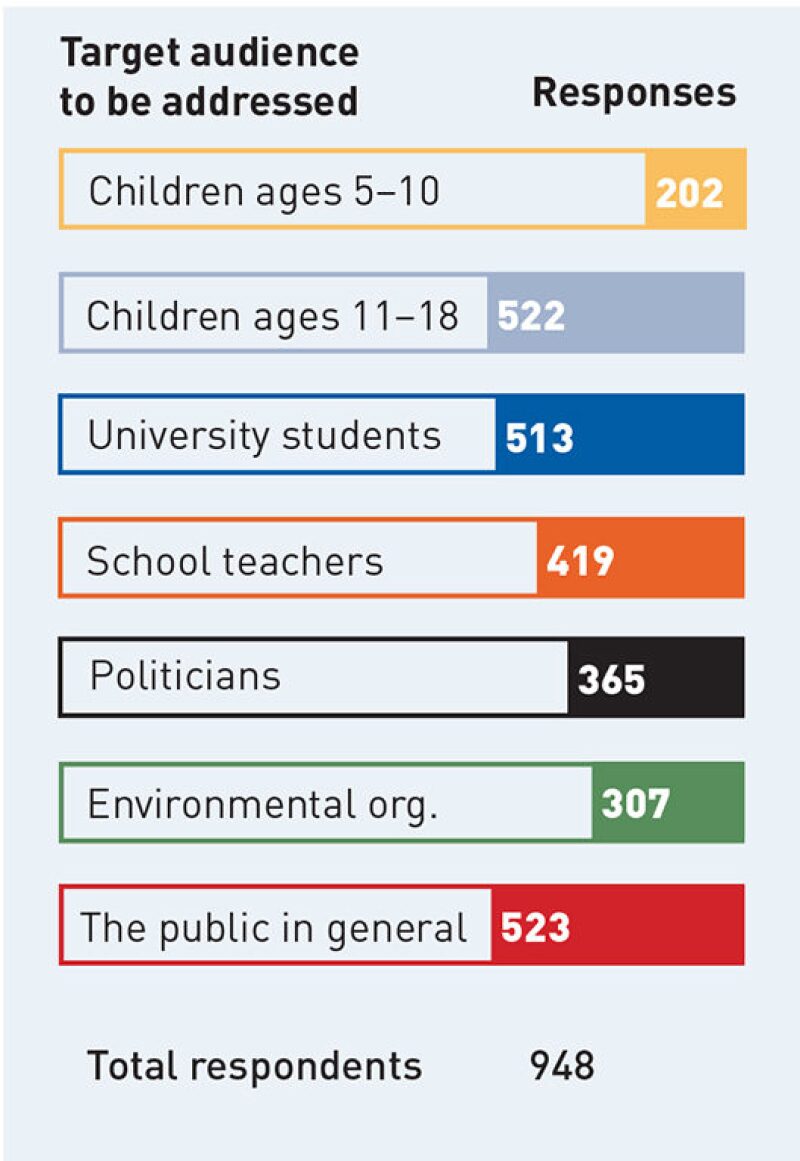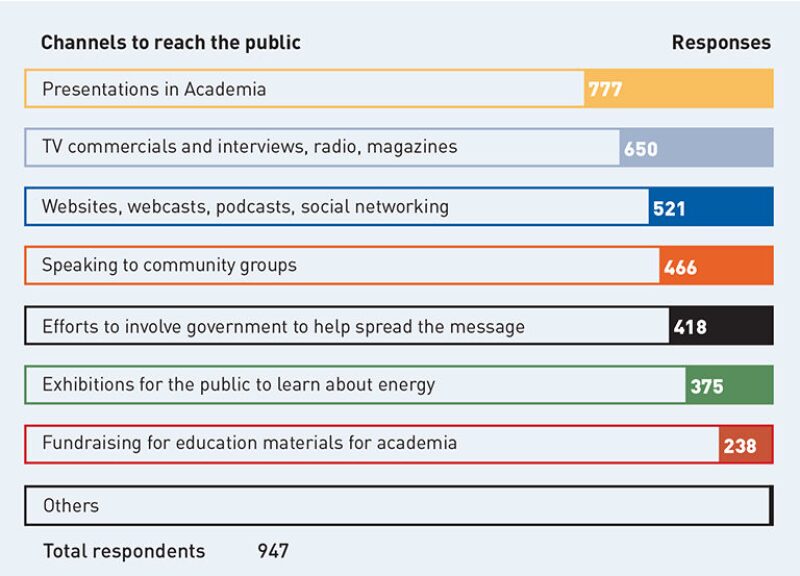For this article, The Way Ahead addressed one of the most challenging topics for professionals in the oil and gas industry: public energy education. When oil prices peaked at USD 147/bbl in 2008, everyone felt the crunch. Food prices spiked and transportation costs rose. Global warming and the environmental impact of energy use took center stage in the public debate. Yet, media coverage, public debate, and politicians still seem to lack a fundamental understanding of where energy comes from, the costs and trade-offs related to different energy sources, technological and geographic constraints, and the hard choices that lie ahead. This article illustrates that industry professionals feel a responsibility to educate their friends, family, and neighbors, and students of all ages about energy.
Energy education: What is it? To whom? How to get involved?
A total of 1,036 SPE members responded to this online survey, a third of whom were under 36 years of age. This survey aimed to explore E&P professionals’ views of different aspects of public energy education as well as their level of commitment to educating the public.
What is energy literacy?
The US Energy Policy Act of 2005 mandated that the US Secretary of Energy convene an Energy Education Forum of representatives of all available energy sources, academia, corporations, professional associations, trade groups, and nongovernmental organizations to find a path forward to create an unbiased platform to educate the public about energy. Their first challenge was to define energy literacy. The definition developed was: “An energy literate public is a society that understands and appreciates the role energy plays in its economic well-being and the economic cost energy production and use have on society’s (environmental) quality of life. Such a society is capable of making informed, well-reasoned decisions as to its choices for its usage of energy. Such a society is capable of directing its elected representatives to formulate stable and sustainable energy policy reflecting those choices.”
When asked how they would define energy education, survey respondents generally agreed with the above definition.
Why is this so important?
Our survey shows that the majority of E&P professionals (83%) believe an energy-literate public would be beneficial for the oil and gas industry (Fig. 1). One primary benefit is that energy-literate consumers will make informed choices about how they go about their daily lives, the modes of transportation they use, the way they use energy, and the products and services they purchase. Another significant benefit is that the public can make educated decisions about energy-related legislation. Several respondents specifically emphasized that public awareness about the relative costs of all energy sources, including alternatives, should be a primary objective of any energy-education program.

Bob Keiller, Chief Executive Officer, PSN “Taking personal responsibility for energy consumption is vital—people need to know the true cost of their lifestyle options, and in time, society can move to make energy wasting unacceptable.”
If energy is so important, why do people know so little about it? One issue is their level of interest in the subject. Survey respondents felt that only one-third of the general public has a keen interest in energy issues while the other two-thirds thought they have only a moderate interest or no interest at all.
Henry Edmundson, Director of Technical Communities and University Relations, Schlumberger “People take energy for granted. Do you or I understand how water comes to the house or how sewage gets dealt with? Do we understand how PCs work? Nowadays, it’s hard to tell what’s under the hood of a car, everything is so automated.”
The public only has a limited wilingness to absorb information regarding energy. As long as people can drive up to the pump and fill their gas tanks, or flip on the lights at home—and the cost of all this fits within their budget—the need to understand the complex details can easily be dismissed by many.
Ian Phillips, Director–CO2 Infrastructure, CO2 Deepstore “The education system should provide enough basic technical and scientific knowledge that people can understand the energy business—and have the curiosity to know about it.”
Why has public energy education met with such limited success?
Most survey respondents (84%) said that any educational program/message from the oil and gas industry would be considered biased. This perception is even higher, almost 91%, among executives and professionals above 45 years of age. The primary learning from these results is that the messenger is just as important as the message. To be effective, the message must be factual (verified by an independent third party), it must cover all available energy options, and it must be delivered by an unbiased third party.
Who bears the responsibility?
Almost all respondents (97%) agree that the energy industry bears the main responsibility or at least partial responsibility for educating the public about energy (Fig. 2).

Øystein Håland, Senior Vice President, Subsurface Technology, Statoil “We live in a tabloid world, where information that cannot be printed in headlines is difficult to get through. Consequently, we must strive to simplify and improve our communication skills so we can argue against NGOs and others that claim fossil fuel will choke our civilization.”
Among the overwhelming majority that believes the energy industry bears responsibility for educating the public about energy, 89% also feel “personally” responsible for this task. The remainder believes this is the responsibility of experts.
Carlos Tadeu da Costa Fraga, R&D Executive Manager, Petrobras “It is primordial and urgent to establish a broad effort in search for adequate balance, ensuring availability and accessibility of energy through environmentally acceptable energy generation and use. This effort must obviously address the education of our society on the subject, led primarily by the energy industry actors and its regulatory agencies.”
Getting in front of the public
Almost half of survey respondents have already been involved in providing some form of energy education to the public. As industry experience increases, that proportion increases. Survey responses from industry executives indicate that they are deeply engaged and committed to providing energy education to the public. Of those with some experience in public energy education, the overwhelming majority (88%) have had a positive experience and are willing to do it again.
Chad Deaton, Chairman, President, and Chief Executive Officer, Baker Hughes “The United States and the world needs clean energy, and we’re dedicated to providing it in a very responsible way. We as an industry need to do a better job educating the public that we are not the problem—we’re part of the solution.”
How can SPE support members wishing to engage directly in public energy education?
Of those surveyed (in this case being allowed to give multiple responses), 67% cited establishing relationships with regional educational authorities so that they will allow volunteers to contribute energy-education information to school curricula. Other responses cited most frequently included providing presentation templates and teaching tools/resources (65%), providing web-based tools and training on how to present on oil and gas and other energy sources (61%), creating company awareness of the value of allowing staff volunteer time for public energy-education activities (59%), and providing books and reference material to give to attendees at events (53%). Providing staff support for scheduling and managing events, providing in-person training, and creating a peer-recognition program for exceptional volunteer efforts were also cited, but with less frequency.
Henry Edmundson, Director of Technical Communities and University Relations, Schlumberger “We need an Al Gore to speak on our behalf as effectively as he has done on behalf of global warming. The fact that we may discredit half of what he says does not diminish the power of his ability to reach ordinary people. The public has no idea that the oil industry is as technologically advanced as engineering gets anywhere, and that, with some notable exceptions, we have an amazing safety and environmental record. Try shipping 90 million barrels around the world each day without creating a big mess.”
Identifying and reaching the target audience
Respondents felt the public in general needs to be addressed for the education effort to be effective. Efforts should focus on children of ages between 11 and 18, university students, and teachers (Fig. 3). An effort to educate politicians also ranked high. Young professionals showed a preference to focus on students, while those above 35 years of age preferred to focus on the general public.

Respondents cited giving presentations to students at schools and universities and sharing the industry’s story through the mass media as the most effective ways to convey a message to the target audience (Fig. 4).

Conclusion
The responses to this survey indicate that there is a significant opportunity to educate the public more fully about energy. Industry professionals feel that both our industry and they, personally, bear a responsibility to educate the public. Those who have engaged in the effort have had positive experiences and are willing to do so again. Given that only half of the respondents have any experience in educating the public, but most feel responsible, the next step is to raise awareness of the available resources on www.energy4me.org and encourage sections and student chapters to use those resources. Sections can also take a more proactive effort to coordinate speaking opportunities between members and local students.


